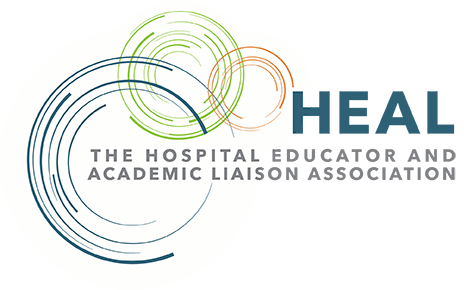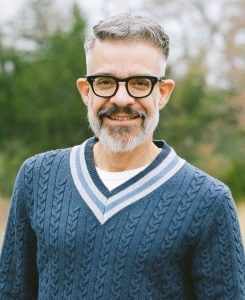Conference Schedule – at a glance
Information included below:
- Contact hours
- Schedule
- Keynote speaker
- Session descriptions
- Speaker biographies
Contact Hours
Certificates of Contact Hours (up to 16 hours) will be awarded to attendees who complete post-session surveys. All content (pre-recorded and recorded) will be available for viewing and professional development credit for 30 days following the live conference day.
Additionally, our keynote speaker, Dr. Adam Saenz, is providing a FREE year-long subscription for all participants to access the Learning Library, available at www.appliedEQgroup.thinkific.com. This site provides up to 15 hours of additional training.
While the live portion of the conference is only one day, we are excited to offer this extended and robust professional development opportunity!
(Schedule subject to change)
| Virtual HEAL Association Conference | ||||
|
10:30-10:45 am est
|
Welcome and Kickoff | |||
|
10:45am-12:15 pm est
|
Live General Session/Keynote Emotional Intelligence and the Power of Connection Dr. Adam Saenz, PhD |
|||
|
12:15-12:20 pm est
|
Break | |||
|
12:20-1:20 pm est
|
Breakout (Live Lecture)
Standardized School Screening to Identify Educational Needs and Link Supports to Children with Chronic Illness
|
|||
|
Breakout – Poster Session Poster #1: Identifying and Addressing Unmet Career/School Preparedness Needs of Pediatric and Young Adult Oncology Patients During Treatment and Survivorship Poster #2: Returning to School After a Spinal Cord Injury
|
||||
|
Breakout (Live Lecture)
How to Build Relationships That Work – presented by our Keynote Speaker: Dr. Adam Saenz
|
||||
|
Breakout (Roundtable Discussion)
New Member Orientation
|
||||
|
1:20-1:50 pm est
1:50-2:00 pm est |
Lunch and Awards – bring your lunch and celebrate our annual recipients!
Break |
|||
|
2:00-3:00 pm est
|
Breakout (Roundtable Discussion)
Supporting Students with Sickle Cell Disease to Minimize School Avoidance and Chronic Absenteeism
(Limited to 25 participants)
|
|||
|
Breakout (Live Lecture)
A Toolkit for Planning, Implementing, and Evaluating a Hospital-Based Internship Program for Preservice Teachers
|
||||
|
Breakout (Panel Discussion)
School-Friendly Health System: We are Better Together
|
||||
|
Breakout (Roundtable Discussion)
Leading Programs – the residual effect of COVID and leading transformations (Limited to 25 participants)
|
||||
|
3:00-3:10 pm est
|
Break | |||
|
3:10-4:10 pm est
|
Breakout (Live Lecture)
Understanding Functional Neurological Disorder: A Guide for Working with Schools
|
|||
|
Breakout (Live Lecture)
The Neuropsychology of Trauma and How It Impacts Learning – presented by our Keynote Speaker: Dr. Adam Saenz
|
||||
|
Breakout (Roundtable Discussion))
Developing a Front Door for School Partnership: How to Create Bi-directional Collaboration Between Schools and Healthcare Professionals
(Limited to 25 participants)
|
||||
|
Breakout (Roundtable Discussion)
Member Engagement: Think tank for sharing ideas with the Executive Board
(Limited to 25 participants)
|
||||
|
4:10-4:20 pm est
|
Break | |||
|
4:20-5:20 pm est
|
Live Closing Session
How to Be Sustainable When Working With High-Needs Students: Understanding the sources of stress and how to build a relational team that will keep us in the game presented by: Dr. Adam Saenz, PhD
|
|||
| 5:20-5:30 pm est | Closing Remarks | |||
| PRE-RECORDED SESSIONS: | ||||
|
Embedding Neuropsychology and a School Liaison in an Oncology Survivorship Clinic: Improving access and reducing barriers to educational supports.
|
||||
|
Dr. Adam Saenz’s collection of courses at Emotional Intelligence Workshops That Engage — Applied EQ Group Registered/paid attendees will receive unique code at the end of conference for 1 year of access to this library of workshops. |
||||
Adam Sáenz, Ph.D.
Founder & CEO, Applied EQ
Adam Sáenz, Ph.D., D. Min. is a licensed psychologist, ordained minister, author, and emotional intelligence expert. Adam has worked in education, corporate and non-profit sectors for over twenty years. He has delivered state national keynote addresses based on his research, which focuses on stress management, the dynamics of effective relationship building, personality assessment, and emotional intelligence. Among his publications are the best-selling The Power of a Teacher, Relationships That Work, and his most recent release, The EQ Intervention: Shaping a Self-Aware Generation Through Social and Emotional Learning. He currently serves as a supervising psychologist for the Texas A&M Medical School and for the Texas A&M Department of Athletics. Adam and Kim celebrated their 26th wedding anniversary in 2022; they love their four adult children, but they are digging the empty nest.
A Toolkit for Planning, Implementing, and Evaluating a Hospital-Based Internship Program for Preservice Teachers
Presented by: Rebeca Grysko, PhD, CBIS, Nemours Children’s Florida and Michelle Kelley, EdD, Lee-Anne Spalding, EdD, and Madelena Lawida, University of Central Florida
The Peds Academy at Nemours Children’s is a unique, hospital-based internship program for preservice teachers. Teacher Interns from University of Central Florida receive specialized training and provide individualized instruction to address the educational needs of patients during prolonged hospitalization. Research shows that this internship experience helps enhance preservice teachers’ preparedness for supporting the educational needs of students with medical conditions. Due to the success of the Peds Academy, the Nemours leadership team has developed a comprehensive toolkit for other hospitals and/or universities who are interested in implementing a similar internship program.
Developing a Front Door for School Partnership: How to Create Bi-directional Collaboration Between Schools and Healthcare Professionals
Facilitated by: Anna Starczynowski, MEd, Cincinnati Children’s
Healthcare systems are large and complex. Cincinnati Children’s has created a “front door” for easier access and collaboration with our school partners. Hear from our project leader in this work: developing the plan for creating information hubs internally and externally for school-related information, considerations during development and learnings along the way. The Center for School Services and Educational Research has implemented working committees as the infrastructure to support the “front door” and our hospital’s efforts towards living out the School-Friendly Health System core principals. Join in the conversation and share how your institution coordinates school-related efforts.
Embedding Neuropsychology and a School Liaison in an Oncology Survivorship Clinic: Improving access and reducing barriers to educational supports
Presented by: Elizabeth Stuchell, MSW and Kaitlin McCloskey, PhD, University of Michigan Health
By embedding a neuropsychologist and school liaison into a multidisciplinary oncology survivorship clinic, the group intended to address barriers to accessing neuropsychological evaluations, opportunities for caregivers, patients, and schools to understand cognitive impacts of treatment and support the creation and utilization of academic accommodations. A review of patient data highlighted an increase in referrals and evaluations but was less clear whether meeting with a neuropsychologist and school liaison was directly linked to increased school accommodations.
How to Build Relationships That Work
Presented by: Adam Sáenz, Ph.D., D. Min.
Most of us already know that relationships matter in any field, but particularly in education. The question is: how? How do I build life-impacting relationships with students? How do I build resourceful relationships with my colleagues on campus? How do I build supportive relationships with my students’ parents?
Identifying and Addressing Unmet Career/School Preparedness Needs of Pediatric and Young Adult Oncology Patients During Treatment and Survivorship
Presented by: Sidney Kushner, BS and Sloane Strauss, MS, Connecting Champions
This program was developed to meet the psychosocial and career/school preparedness needs of pediatric and young adult oncology patients during treatment and survivorship. Patients were provided with a mentor in a field they were interested in. A system was developed within the program to collect data on the unmet needs of participants before they meet their mentor, with a six month follow-up survey assessing the impact the program’s mentorship had on the needs reported.
Leading Programs–The Residual Effect of COVID and Leading Transformations
Facilitated by: Michelle Harvey
COVID has changed the way we work, educate, and lead. Join the conversation and learn from colleagues as we share tips and tricks for navigating the “new normal.”
Member Engagement: Think Tank for Sharing Ideas with the Executive Board
Facilitated by: Kelly Ihejiawu, MA
Join us to discuss all things HEAL. Share, suggest, and collaborate with HEAL leaders to help shape the future of our organization.
New Member Orientation
Facilitated by: Kelly Ihejiawu, MA and Mindy Elliott, MS
New to HEAL? Join this informative session to learn about our mission, vision, and what membership has to offer you.
Returning to School After a Spinal Cord Injury
Presented by: Kelsey Shearman, MA, Shepherd Center
This poster will outline the various steps in the school process following a spinal cord injury, highlighting the return to school process. The goal of our return to school process is to make patients, families, and their schools feel confident in returning to in-person learning.
School-Friendly Health System: We are Better Together
Multi-Disciplinary panel: Patty Hadden, MEd, Deer Park Community City School District, Amy King, BS, CNP and Zeina Samaan, MD, Cincinnati Children’s
Facilitated by: Lenora Nardelli, MEd, Cincinnati Children’s
Utilizing the School-Friendly Health System framework as our guiding principles, Cincinnati Children’s has implemented multiple strategies to engage our school partners in improving efforts that will positively impact our mutual patients’/students’ care. This panel discussion will consist of multidisciplinary professionals across the systems of healthcare and education. Professionals will share how intentional collaboration, vulnerability, and quality improvement science are being used to work through barriers for improved communication and transitions of care between two complex systems.
Standardized School Screening to Identify Educational Needs and Link Supports to Children with Chronic Illness
Presented by: Christie A Ruehl, JD, MBA and Kyle Landry, MEd, Children’s Wisconsin
Children with chronic illnesses are at-risk for an array of neuropsychological deficits that may affect development, psychosocial skills and academic attainment. While some medical centers offer school liaison services, nurse clinicians may lack a consistent approach to identify school concerns and determine applicable support services, reflecting an urgent need to develop these resources. The aim of this quality improvement project was to create and seamlessly integrate a school screening system into outpatient cardiology clinic workflow.
Supporting Students with Sickle Cell Disease to Minimize School Avoidance and Chronic Absenteeism
Facilitated by: Courtney Emery, M.Ed, NBCT, DanceBlue Kentucky Children’s Hospital Hematology/Oncology Clinic
Students will Sickle Cell Disease often struggle with school avoidance and chronic absenteeism. During this roundtable discussion, a brief overview of Sickle Cell Disease will be discussed, along with potential factors that lead to school avoidance and chronic absenteeism. Then a dialogue will begin between the presenter and the attendees about best practices for supporting student with Sickle Cell Disease in an effort to minimize school avoidance and chronic absenteeism.
The Neuropsychology of Trauma and How It Impacts Learning
Presented by: Adam Sáenz, Ph.D., D. Min.
Understanding the root of trauma and how we can cultivate a well- functioning classroom. How do VUCA (volatility/uncertainty/complexity/ambiguity) impact child and adolescent development? How do ACEs (adverse childhood experiences) impact child and adolescent development? How do SCARF needs (status/certainty/autonomy/relatedness/fairness) impact child and adolescent development?
Understanding Functional Neurological Disorder: A Guide for Working with Schools
Presented by: Deborah South, MEd and Wendi Lopez, PhD, Cincinnati Children’s
Functional Neurological Disorder (FND) occurs when neurons misfire in the body causing the brain to become stuck when sending and receiving messages. The brain and body can get in a cycle of not communicating well with each other resulting in inaccurate messages. As a result, individuals experience symptoms such as loss of movement of limbs or non-epileptic seizures resulting in an interruption with their school functioning. This presentation will provide participants and school teams with the tools needed to help supports students as they are receiving treatment for FND.
Additional Bios will be added as we receive them.





















